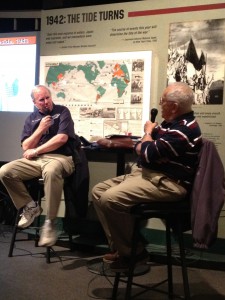On Saturday, March 10, in the American Airpower Heritage Museum gallery, 75 spectators were entertained, amused and educated by Mr Andy Kauffman, who regaled us with stories of his life as a waist gunner on a B-17 with the 100th Bomb Group. Mr. Kauffman had prepared a PowerPoint presentation which aided him and enlightened the audience, and was interviewed by Bill Coombes as a part of the ongoing Saturday Seminar Series.
Mr. Kauffman flew twelve missions over “Fortress Europe”. When asked about the abilities of the B-17 “Flying Fortress” he made it clear that no bomber was invulnerable to the German Luftwaffe with their Messerschmitt and Focke-Wulfe fighters. “The Germans were good”, he remarked, emphasizing that on many missions they had no fighter cover and their best defense was a tight formation so that they had overlapping fields of fire.
His plane was shot down in November 1943, returning from a mission in Poland, and he was one of only four crew members that survived. As he parachuted from the doomed aircraft, the thought that went through his mind was that he was going to miss the “hot date” he had waiting for him back in London! Mr. Kauffman spent almost two years in German POW camps. Most of that time was in the Krems camp near Vienna, Austria (Stalag 17B), which held about 4200 POW’s, all of whom were USAAF enlisted personnel. While he did lose about twenty pounds as a captive, he was treated within humane guidelines. One memory was that the chow line consisted of potatoes, hot water, and more potatoes. Their diet was supplemented by Red Cross packages, which contained canned foods and rations like cigarettes and coffee, which were often involved in bartering among prisoners, and between prisoners and guards.
Homemade radios constructed from crystals smuggled into camp, allowed prisoners to keep track of the progress of the war. Oftentimes they would witness American B-24‘s on their way to or from targets like Wiener-Neustadt. Mr. Kauffman joked that since our strategic bombing wasn’t exactly pinpoint, they were often concerned that our bombardiers might miss their target and bomb the camp instead!
Toward the end of the war the prisoners began a forced march into the heart of Germany, but freedom finally was realized on May 9, 1945 when they were liberated (after being discovered by the Russians) by units of Patton’s army in Brunau, Bavaria. Mr. Kauffman considers himself very fortunate to have survived the war.
Our hats are off to Mr. Andy Kauffman, a member of “The Greatest Generation”.




